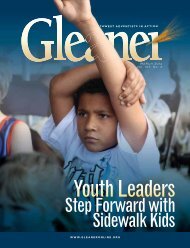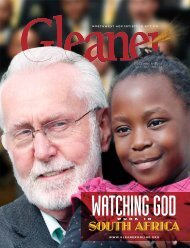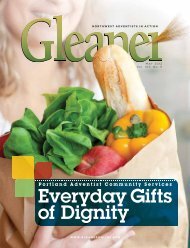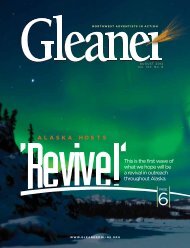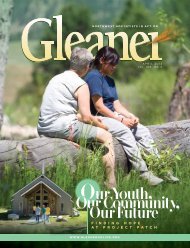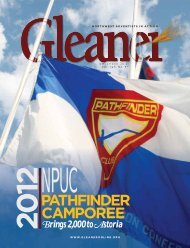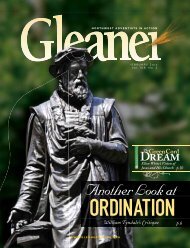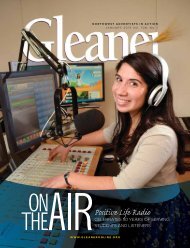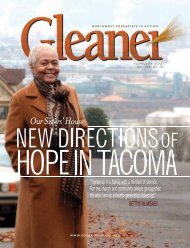Download PDF (5.2mb) - GleanerOnline.org
Download PDF (5.2mb) - GleanerOnline.org
Download PDF (5.2mb) - GleanerOnline.org
You also want an ePaper? Increase the reach of your titles
YUMPU automatically turns print PDFs into web optimized ePapers that Google loves.
FEATURE<br />
Rather than feel<br />
defensive or<br />
judgmental, we should<br />
welcome respectful<br />
dialogue about<br />
Scripture with others.<br />
Asking Questions<br />
Pastor Arnold, who helped initiate the<br />
study, said the data aligns with what he’s<br />
seeing up close and personally. “I have had<br />
conversations with many young adults who<br />
do not embrace every teaching of the Adventist<br />
Church,” Arnold said. “Some have<br />
perspectives that are not reflective of the<br />
official teaching of the Adventist Church.<br />
Some understand the official teaching and<br />
disagree with it on some points.”<br />
Arnold said the two subjects that he<br />
gets asked about most are the doctrine of<br />
Christ’s ministry in the heavenly sanctuary<br />
and the proper use of Ellen White’s writings.<br />
“People still leave the church over their<br />
feelings being hurt,” Arnold said. “But<br />
one of the main underlying factors is the<br />
mistreatment they got because they were<br />
questioning. If we can keep a positive relationship<br />
with them while they are processing<br />
things, it communicates that they are<br />
welcome and wanted in our fellowship.”<br />
DeFoor, who left the Adventist Church<br />
and later returned, said he represents a<br />
boomer generation that had difficulty<br />
separating salvation in Christ from personal<br />
behavior such as Sabbath-keeping. “I know<br />
we say that the church doesn’t teach this,”<br />
DeFoor said, “but certain people give the<br />
strong impression that it does teach this.”<br />
Based on his outreach to other former<br />
Adventists, DeFoor said that the Adventist<br />
Church needs more emphasis on the teaching<br />
and preaching of the Gospels. “We need<br />
to understand that it must be Jesus first,”<br />
DeFoor said. “That will lead us to a better<br />
understanding of our heavenly Father.”<br />
Goolsby said the Adventist Church isn’t<br />
the only faith community seeing a transient<br />
membership. She cites a 2008 Boston Globe<br />
article, stating that “44 percent of Americans<br />
have left the religion traditions in<br />
which they grew up.” 2<br />
“Social media has connected our lives,”<br />
Goolsby said. “We are now more aware of<br />
what our friends, family, and contemporaries<br />
are doing, thinking, and feeling. If<br />
those friends have issues or questions about<br />
their church or their belief system, they are<br />
generally speaking out through social media.<br />
This causes people who might not otherwise<br />
have questions or issues to suddenly<br />
start asking some of the hard questions.”<br />
Goolsby said a fundamental question to<br />
consider is whether the Adventist Church<br />
is a “one-size-fits-all” religion. “Does the<br />
member,” she asked, “have to take it all or<br />
take nothing? And how does that fit with<br />
the plan of salvation?”<br />
Sahlin, who wrote the 1998 report, said<br />
that his current research also reflects changing<br />
perspectives among former Adventists.<br />
“The relational issues are not as acute as<br />
they were in the 70s, 80s, and 90s,” Sahlin<br />
said. “They are still there, but there is this<br />
newer issue of how people experience<br />
Christian faith.”<br />
Sahlin said that newer faith issues among<br />
Adventists are “largely driven by the<br />
evangelical critique of Adventism — that<br />
it’s based on salvation by works because of<br />
its insistence on the Jewish Sabbath and<br />
because of an extrabiblical prophet from<br />
which they get their doctrines.”<br />
Many Adventists today, Sahlin said,<br />
aren’t prepared to handle this critique. “The<br />
fallout of our own theological debates of<br />
the 1980s and 1990s,” he said, “was a new<br />
generation that is uncertain about its faith<br />
and not well-equipped to respond to the<br />
evangelical critique.”<br />
Sahlin said that Adventists have quit<br />
making their own biblical critique of the<br />
evangelical faith, such as that found in<br />
The Great Controversy, Ellen White’s 1911<br />
work. “We have tried not to be different,”<br />
said Sahlin, noting that in the more recent<br />
church-published Great Hope, critiques of<br />
other denominations are largely absent.<br />
June 2013 • GLEANER<br />
9




